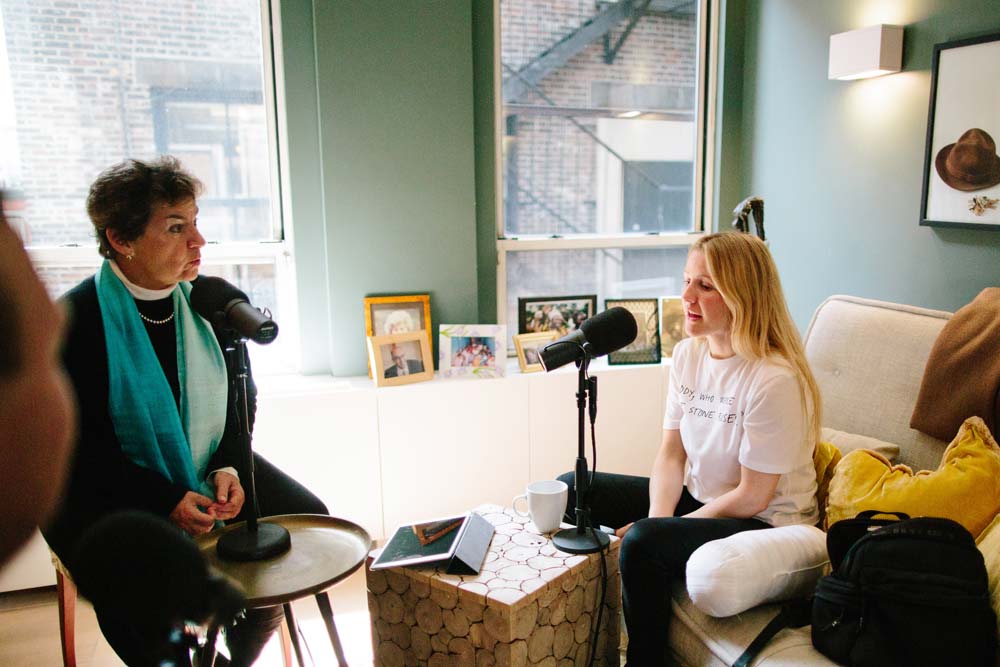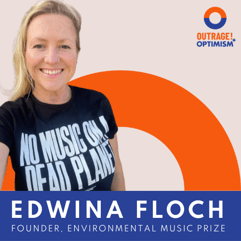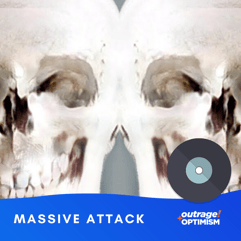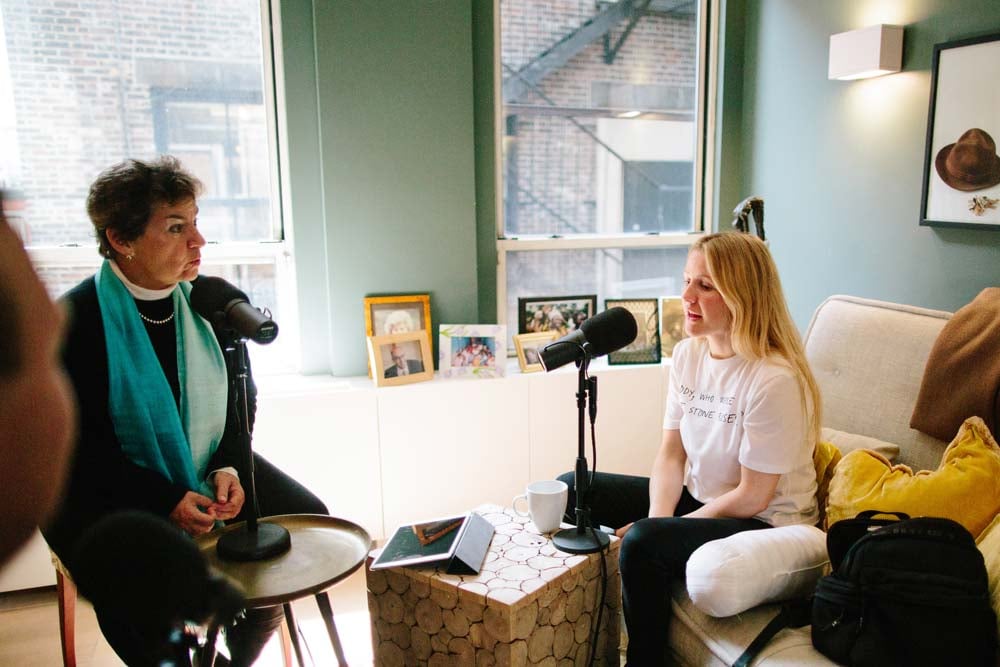The Role of Music in Accelerating Climate Action
We explore the power of music to move hearts and minds in the face of the climate crisis. Read about our musical guests who use their voice to inspire climate action.

Whatever our skills, interests, or professions, there is a role for every one of us in the climate movement – and this is certainly true of those in creative fields. This deep dive explores the power of music to move hearts and minds.
As co-host Paul Dickinson said in an Outrage + Optimism episode: “These musicians and great artists actually are the backbone of social movements. They've been so influential, back to the Vietnam War, all through history, in fact.” From Strange Fruit to A Change Is Gonna Come to We Shall Overcome, songs have a rich history of helping to raise awareness and uniting people around common causes. There’s so much that music has to offer the climate movement.
Considering the breadth of musical talent that has appeared on Outrage + Optimism, it’s clear that many artists are working to effect positive change in their communities, and around the globe. The last decade has seen a surge in musical references to the climate crisis, but we need everyone on board if we’re going to limit warming to 1.5 Celsius above pre-industrial levels, as outlined in the historic Paris Agreement. That’s why the Environmental Music Prize launched during COP26 in Glasgow with the goal of amplifying the voices of artists who inspire action for climate and conservation. Learn more about our partnership with the Prize below.
This deep dive gathers together some of the artists and musicians who have appeared on Outrage + Optimism. For more, listen to these curated playlists:
While people experience it differently, it’s not uncommon for music to touch the soul, move the heart, stir emotions, and inspire action. Sometimes that inspiration comes directly from the life stories of the artists themselves, as is the case with Musicians in Exile – a group of asylum seekers and refugees from different countries who performed in front of world leaders at COP26 in Glasgow last year.
Dive into Outrage + Optimism’s deep catalogue of episodes featuring artists from various genres for further inspiration.
Launching the Environmental Music Prize
While there’s been a documented surge in environmental references in music over the last few years in places like the United States, that hasn’t been the case for other parts of the world. That includes Australia, where only 1 per cent of songs listed in the country’s premier radio station’s annual poll contained references to the environmental issues. At the same time, an overwhelming majority of Australians said they’re concerned about climate change (75 percent), with an even greater majority supporting the gradual elimination of coal-fired power plants.
 Edwina Floch, founder of the Environmental Music Prize, works to bridge the apparent disconnect between arts and public sentiment around climate.
Edwina Floch, founder of the Environmental Music Prize, works to bridge the apparent disconnect between arts and public sentiment around climate.
In an interview for a special 2022 Earth Day Outrage + Optimism episode coinciding with the launch of the Environmental Music Prize, Floch said she was inspired by previous initiatives, such as the Xprize, and the influential documentary film industry.
“I’m really interested in social change, but also theories of exponential change,” she said on the podcast.
Floch, who previously worked with the Documentary Australia Foundation, a non-profit that supports filmmakers and impact-centered films, was impressed with the industry’s ability to “lead people on a pathway to action through partnerships, and with a very clear theory of change.”
Convinced that the Australian music industry had so much more to offer, she approached Green Music Australia, an organisation that works to improve sustainability in the music industry. They conducted research that found that less than 1 per cent of songs voted most popular by fans over a five-year span included references to the environment.
“Artists do actually really care about these issues…There is a subcategory of artists that is creating this music, but in a certain way, I would say that their audiences are probably those who are also very active in this space. So in a certain sense, they're preaching to the converted,” she said. “And one of my objectives is to bring it more mainstream so that a whole range of different artists are creating this music. One of the ways in which we're going to do it is obviously by creating a cash prize.”
The $AU20,000 cash prize “rewards the artists who already are doing amazing work for the work that they feel has often been ignored or under compensated,” Floch added. “And it will hopefully incentivise new artists to create new music.”
To increase participation, prize organizers opened up the competition to artists who created music with environmental messaging within the last five years. That means artists who created new work inspired by the prize and those that have already contributed to the arts and climate discussion could participate and reach a wider audience. All the submissions needed to come in the form of a music video, published on YouTube, so it could be shared and potentially reach viral status.
“The prize is actually just the tip of the iceberg,” Floch said. “This is about music, but it's really about the environment. It's really about shining light on the environmental movement, the amazing work being done by the organisations and advocates on the frontline. And so they're really key to the design of the prize.”
The prize’s partners, which include influential environmental organisations, will select finalists. They include Greenpeace, World Wildlife Fund, the Wilderness Foundation, Ocean Impact Organisation, and Australian Youth Climate Coalition. Greenpeace, with an audience of more than 1 million people in Australia, will also share the list of finalists after they’re announced and encourage people to vote. “It's a great opportunity for the artists to have their story profiled in a different way,” Floch said.
The Environmental Music Prize officially launched during COP26, with the aim of making the songs available for World Earth Day, which was 22 April. It was also timed to coincide with Australia’s federal elections.
“Over the next month, people will be listening to artists of all different styles, of all different age groups,” said Floch. “We have some of Australia's leading talent and most recognized songwriters, but we also have a 12-year-old, who will be part of the finals. Heavy metal bands, pop, we have a Sikh rapper, a whole collection, and of course, Indigenous artists who feature strongly in the final.”
The prize’s ultimate goal is to inspire action.
“I'm hoping through the Environmental Music Prize, not to tell people what to think, but to connect them deeply, emotionally with these issues,” Floch said on the podcast. “Because, obviously, we need the facts and the science. And thank you to the researchers and scientists out there who have undeniably shown us that climate change exists and all the other interlinked issues that go with that. But how are we going to move people from apathy to action?”
Massive Attack Collaborates With Christiana Figueres
 The Bristol-based band Massive Attack has been active on climate issues for three decades. The pioneers of the trip-hop genre, Massive Attack was influenced by punk bands that embraced politicised music.
The Bristol-based band Massive Attack has been active on climate issues for three decades. The pioneers of the trip-hop genre, Massive Attack was influenced by punk bands that embraced politicised music.
In a sign of its commitment to the climate movement, Massive Attack collaborated with Outrage + Optimism co-host Christiana Figueres for its concept album “Eutopia,” in which Figueres uses spoken word to raise awareness about the climate crisis. Figueres appears on the track titled #ClimateEmergency, which Massive Attack founding member Robert Del Naja, who performs as “3D,” co-produced and turned into a visual spectacle.
“The social fabric of our world, the health of democracies and the wellbeing of people can either be destroyed or made stronger by a crisis such as the one we are living,” Figueres says in her lyrics. “We need to choose this crisis as the moment to anchor ourselves back into the reason humans live in collectives. We are stronger and more resilient together. We will need this solidarity to face what's ahead. Rise to the crises and thrive beyond them.”
In an interview on the podcast, Massive Attack’s Del Naja said the band has been able to strike the right balance between advocacy and entertaining fans.
“For me personally, the kind of political art which is always the most interesting and the most engaging is the kind that's not hectoring. It's not sermonizing,” he said on the podcast. “It’s sort of expansive and it's enjoyable.”
Ellie Goulding on the Climate Crisis: Spread Optimism
Ellie Goulding, the internationally renowned recording artist who grew up in the small village of Herefordshire, has always had a strong connection with nature.
Goulding, who lived about 30 miles from the border with Wales, would frequently hike and go for walks with her uncle, which made her “conscientious” of her natural surroundings. It’s those moments that left an indelible mark on her at a young age.
In an interview with Outrage + Optimism episode highlighting her musical performance in the Netflix hit series “Our Planet,” featuring David Attenborough, Goulding said that she hopes her music “reaches some kind of wavelength with people.”

“Everyone loves music. Music connects to everyone individually in some way or another, and it connects people with things,” she added. “So I've purposely not made my album about nature, just because I do try and keep certain things separate. But when they asked me to do this song, it was a perfect opportunity for me to combine both.” Goulding was referring to her hit single for the “Our Planet” soundtrack, “In This Together,” featuring the British composer Steven Price.
“I actually did two versions [of the song],” she said. “The first version was very much more direct and matter of fact. I'm talking about literally biodiversity loss and the species that have been lost. And I mentioned the names of those species and I think when I sent that version, I think maybe they thought that it needed to be something very relatable because it still—I still don't think people are as connected to nature as we would like them to be. And I think that song was assuming that everybody felt the same way that I did, which is wrong. I think that's something you know, assuming that is not helpful, because people are learning all the time about things and the second version was going more into my natural songwriting state, which is my favorite thing, is to write about heartbreak and loss and unrequited love.”
Goulding is proud of her unique style of singing and hopes it connects with people on a deeper, more spiritual level. She also hopes to share more positive messaging about difficult topics like the climate crisis.
There's lots of negative news. There's also lots of positive news,” she said. “We have to remember that. Even though humans—we've done bad things to this planet, that's putting it lightly. But we've also done incredible things. And I think people forget that. And so the fact is, when things are happening, you know, there are lots of people out there who say not enough has been done. I agree. I think stuff has been done, just not quickly enough.”
AJR on ‘Burn the House Down’ & Energising the Climate Movement
The U.S.-based indie-pop group AJR, consisting of the three Met brothers (Ryan, Adam, and Jack), has also successfully melded activism with music.
The trio’s breakout climate anthem, “Burn the House Down,” has been streamed more than 279 million times on Spotify and viewed 77 million times on YouTube.
“I think we wrote it right at the time that all of that political stuff was happening, but we couldn't write a song saying, ‘Here's what's wrong with the world,’” Ryan Met told Outrage + Optimism. “It needed to be a personal thing: ‘Here's how I'm affected.’ And it ended up being a song about writing a political song.”
One of the challenges is finding a way to connect with fans in a way that makes them excited about the possibilities of overcoming a challenge or optimistic for the future, said Adam Met.
“So much of the climate movement…[is] this fear of the future and this kind of doom and gloom approach. But when I look at the music industry, where I spend so much of my time, it's all about excitement and how do you build excitement with one person at a time to get them involved,” Adam Met said on Outrage + Optimism.
“You get somebody excited and then they follow you on Twitter, or they stream a song and then they buy an album, they buy a ticket to a show, they follow you around the world,” he continued. “It's that ladder of getting people engaged in something. And a lot of my work is, how do we take that and apply that to things like climate?”
Adam Gardner on Greening the Live Events Industry
 For the last 18 years, Adam Gardner and his wife, Lauren Sullivan, have been trying to green the carbon-intensive concert industry through its concert sustainability nonprofit REVERB. The couple has introduced sustainable solutions at hundreds of concerts worldwide by removing single-use plastics, engaging with local community organisations and farms, and encouraging fans to reflect these practices in their everyday lives.
For the last 18 years, Adam Gardner and his wife, Lauren Sullivan, have been trying to green the carbon-intensive concert industry through its concert sustainability nonprofit REVERB. The couple has introduced sustainable solutions at hundreds of concerts worldwide by removing single-use plastics, engaging with local community organisations and farms, and encouraging fans to reflect these practices in their everyday lives.
In an interview with Outrage + Optimism, Gardner, an American guitarist and frontman of the alt-rock band Guster, said the inspiration for REVERB came from Sullivan, an environmentalist. At the time, Gardner would return from tours with his group and lament how wasteful and energy-intensive live events were.
After repeatedly hearing his concerns, Sullivan asked: “What are you going to do about it?”
“Anybody who's been to a concert, all they have to do at the end of the night is look down at their feet to know that there's a real impact here negatively with all the plastic on the ground alone, nevermind 20,000 people driving to and from the show and all the energy that goes into it,” Gardner told Outrage + Optimism.
The concert industry has a long way to go to reduce emissions and waste. In the UK, live music reportedly emits 405,000 tonnes of greenhouse gasses each year.
REVERB has made significant progress greening tours and establishing partnerships with superstar talents, such as Billie Eilish, Harry Styles, and Lorde. REVERB’s efforts directly contributed to the elimination of more than 121 million pounds of carbon dioxide from the air during a Dave Matthews Band tour, Gardner said.
One way artists can help make a difference is by being authentic, he added.
“It's all about knowing your audience, and nobody knows their audience better than the artists themselves,” Gardner said. “So we work very closely with them and their management to make sure that our approach and our messaging and what our focus is within the environmental movement hits home with their fans and makes sense.”
Aurora Spreads Hope Through Music
 Creating explicitly political music was a matter of necessity for the Norwegian superstar Aurora.
Creating explicitly political music was a matter of necessity for the Norwegian superstar Aurora.
In an interview with Outrage + Optimism, Aurora said she wanted to fill a void left by others in her genre.
“I thought if no one's gonna do it, then I'm going to do it,” she said.
Aurora boasts a dedicated fanbase that interacts with her content at a massive scale – to the tune of hundreds of millions of streams and video views.
She considers music a deeply impactful human experience that can help people “understand our emotions, to break us down a bit” before building people back up again. In a world filled with negative news about the climate crisis, Aurora hopes to spread positivity.
“I want to create a release of emotion at the same time as I want to make people believe that it's going to be okay,” she told the podcast.
“The true power lies with a big amount of people together,” she added. “They can change, we can change a lot of things. And I'm so grateful to have them on my team.”
The Sounds of Antarctica
If music opens a door into our consciousness and invites us to experience new perspectives, the sounds of nature can no doubt have an equally powerful effect.
Outrage + Optimism’s Christiana Figueres brought the sounds of Antarctica to us when she was invited on an expedition with Homeward Bound, a leadership initiative focused on STEM (science, technology, engineering, and math). Joined by about 80 women specialising in electrons, microbiology, plant and animal biology, biomedicine, astrophysics, and much more, they embarked on a 20-day research voyage to the planet’s southernmost continent.
Figueres interviewed Melania Guerra, a bioacoustics oceanographer from Costa Rica, who has researched the impacts of noise pollution on ocean-dwelling creatures.
“Anyone who has stuck their head underwater has noticed that our eyes don't properly work underwater; we cannot see very far, [and] in some cases, not more than a few meters,” she said on Outrage + Optimism. “So animals and organisms that have lived for millennia underwater have discovered this as well and have noticed that ocean sound is a much better way of transmitting information. So they have evolved to utilise sounds.”
Guerra played the sounds of two penguin species—the Adélie and Gentoo—which make distinctly different noises. She also opened our ears to Weddell seals, which produce high-frequency noises that could be mistaken for computer-generated sound effects from a science fiction movie.
It’s important to not only learn about how marine life communicates but also the impact we have on their habitats, she said.
“We equate it to what it would be like to be in a city that has a lot of smog and you cannot see very far,” said Guerra. “Because for these animals, sound is their primary sense of perceiving their environment. So imagine that you are in a city where you cannot see 80 per cent of the day. And you cannot walk where you keep bumping into things or don't know how to navigate your surroundings. So that's why we have given it this name of acoustic smog.
“That's what that curtain of noise is doing to these animals,” she continued. “And when you think that about 90 or 95 per cent of all the traded goods in the world at some point are on a ship traveling to their destination, then we have some part to play in that. We have to be really thoughtful about our consuming habits and try to choose things that are not coming from very far away so that we don't add extra noise underwater.”
As we’ve seen over the last few years, there’s power in movements. The youth climate protests, for example, have not only united people across generations but reminded us that the fight for our collective future requires everyone to get involved. That’s especially true for artists across the world, who have a unique ability to connect with and inspire people from all walks of life. The challenge we face demands action—and as we’ve heard from so many musical artists, one song or a single album can make a world of difference.
